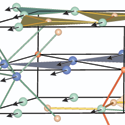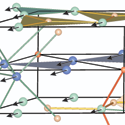Cooling with magnets
A magnetically ordered crystal can act as a refrigerant by absorbing the heat necessary to disorder its spins. Magnetic cooling via this magnetocaloric effect can reach sub-Kelvin temperatures.
In an article appearing in Physical Review B, Danmin Liu of the Beijing University of Technology, Robert Cava of Princeton University, Jeffrey Lynn of NIST, and collaborators in China, Canada, and the United States study various compositions of the promising refrigerant with neutron diffraction and magnetization measurements. They find that temperature or a magnetic field can drive a first-order phase transition between a paramagnetic and ferromagnetic phase. The magnetic entropy change between these phases—a measure of the efficiency of the magnetocaloric effect—is determined by the degree of completeness of the conversion from one phase to the other. The composition exhibits a magnetic entropy change of about , which is among the highest achieved.
Although a record magnetocaloric efficiency was engineered by appropriately tuning the concentration of , there are still inhomogeneities in the distribution of , and the conversion from one phase to another is not complete. These findings suggest that by perfecting the recipe, an even larger magnetocaloric effect should be possible in this material. – Alexios Klironomos





